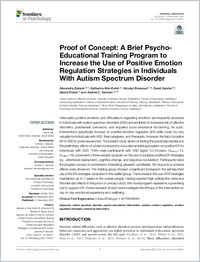Proof of Concept: A Brief Psycho-Educational Training Program to Increase the Use of Positive Emotion Regulation Strategies in Individuals With Autism Spectrum Disorder
IPC
- Zaharia, Alexandra Swiss Center for Affective Sciences, University of Geneva, Geneva, Switzerland. Faculty of Psychology, UniDistance Suisse, Brig, Switzerland. Institute of Special Education, University of Fribourg, Fribourg, Switzerland
- Noir-Kahlo, Katharina Swiss Center for Affective Sciences, University of Geneva, Geneva, Switzerland. Réseau Fribourgeois de Santé Mentale, Fribourg, Switzerland
- Bressoud, Nicolas Swiss Center for Affective Sciences, University of Geneva, Geneva, Switzerland. Institute of Special Education, University of Fribourg, Fribourg, Switzerland. Haute École Pédagogique du Valais, Saint-Maurice, Switzerland
- Sander, David Swiss Center for Affective Sciences, University of Geneva, Geneva, Switzerland. Faculty of Psychology and Educational Sciences, University of Geneva, Geneva, Switzerland
- Dukes, Daniel ORCID Swiss Center for Affective Sciences, University of Geneva, Geneva, Switzerland. Institute of Special Education, University of Fribourg, Fribourg, Switzerland
- Samson, Andrea C. ORCID Swiss Center for Affective Sciences, University of Geneva, Geneva, Switzerland. Faculty of Psychology, UniDistance Suisse, Brig, Switzerland. Institute of Special Education, University of Fribourg, Fribourg, Switzerland
- 01.11.2021
Published in:
- Frontiers in Psychology. - Frontiers Media SA. - 2021, vol. 12, p. 705937
Autism spectrum disorder
Psycho-educational intervention
Positive emotion regulation
Emotion regulation strategies
Behavioral intervention
English
Attenuated positive emotions and difficulties in regulating emotions are frequently observed in individuals with autism spectrum disorders (ASD) and are linked to increased risk of affective disorders, problematic behaviors, and impaired socio-emotional functioning. As such, interventions specifically focused on positive emotion regulation (ER) skills could be very valuable for individuals with ASD, their caregivers, and therapists. However, the field of positive ER in ASD is under-researched. The present study aimed at testing the practical potential and the preliminary effects of a brief novel psycho-educational training program on positive ER for individuals with ASD. Thirty male participants with ASD (aged 10–35 years; Ntraining = 14, Nwaitlist = 16) underwent a three-session program on the use of adaptive positive ER strategies (i.e., attentional deployment, cognitive change, and response modulation). Participants rated the program as easy to understand, interesting, pleasant, and likable. No dropouts or adverse effects were observed. The training group showed a significant increase in the self-reported use of the ER strategies compared to the waitlist group. The increase in the use of ER strategies maintained up to 7 weeks in the overall sample. Having reached high satisfaction rates and the intended effects in this proof of concept study, this novel program represents a promising tool to support ER. Future research should next investigate the efficacy of the intervention on day-to-day emotional experience and wellbeing.
- Faculty
- Faculté des lettres et des sciences humaines
- Department
- Département de Pédagogie spécialisée
- Language
-
- English
- License
- CC BY
- Open access status
- gold
- Identifiers
-
- DOI 10.3389/fpsyg.2021.705937
- ISSN 1664-1078
- Persistent URL
- https://folia.unifr.ch/unifr/documents/324879
Statistics
Document views: 59
File downloads:
- zahariaetal.2021.proofofconceptabriefpsycho-educationaltrainingprogramtoincreasetheuseofpositiveersinasd_pv_0.pdf: 132
